There has been a surge in new books about Ulysses S. Grant in recent years as Grant’s reputation slowly recovers after being pummeled throughout the 20th century.
Although Grant was very popular during his lifetime, his reputation took a hit after the various scandals of his presidency and his popularity continued to decline due to constant attacks from Lost Cause supporters, leading to a lack of interest in books about him.
Grant’s popularity is on the rise again though and he is now being rediscovered by historians who see him not as the war hero turned failed president but as a complex, stoic and savvy leader.
With all the new books on Grant is hard to know where to start. That’s why I’ve compiled a list of what are considered the best books on Ulysses S. Grant.
These books have great reviews on sites like Amazon and Goodreads, many of them are best-sellers and they have great reviews from critics.
I’ve also used many of these books in my research for this website so I can personally say they are some of the best on the topic.
The following a list of the best books about Ulysses S. Grant:
(Disclaimer: This article contains Amazon affiliate links. As an Amazon Associate I earn from qualifying purchases.)
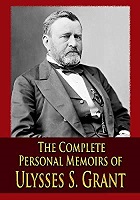 1. Personal Memoirs of U. S. Grant by Ulysses S. Grant
1. Personal Memoirs of U. S. Grant by Ulysses S. Grant
Published in 1885, this two-volume autobiography by Ulysses S. Grant is mostly about Grant’s military career during the Mexican-American War and the Civil War.
The book only briefly discusses Grant’s childhood and his presidency and instead details his military career, discussing his successes as well as his failures with a straightforward honesty.
Grant’s clear and concise writing style, at a time when most books were written with elaborate and flowery language, helped contribute to the book’s success.
The book was commissioned and published by Mark Twain and was written as Grant was dying of throat cancer, which almost prevented him from finishing it, according to Grant in the book’s preface:
“The first volume, as well as a portion of the second, was written before I had reason to suppose I was in a critical condition of health. Later I was reduced almost to the point of death, and it became impossible for me to attend to anything for weeks. I have, however, somewhat regained my strength, and am able, often, to devote as many hours a day as a person should devote to such work. I would have more hope of satisfying the expectation of the public if I could have allowed myself more time.”
Grant wrote the book at a furious pace and finished the manuscript just one week before his death in July of 1885.
The book received positive reviews when it was published and became a best-seller, selling over 300,000 sets, and earning his family over $450,000.
It has remained in print ever since and and is still a consistent seller. The book is considered one of the best Civil War books and one of the best presidential biographies ever written and has also produced some of Grant’s most memorable quotes.
Grant biographer, Ron Chernow, describes the book as a “literary masterpiece” while another Grant biographer, Jean Edward Smith, dubbed it the “greatest military autobiography in the English language.”
In 2017, the Guardian listed the book at number 55 on its list of the 100 Best Nonfiction Books and praised the book for its honesty and its fascinating first hand accounts of the Civil War:
“The unputdownable heart of Grant’s book is his eyewitness account of the vicissitudes of the American civil war: the outbreak of hostilities; the battle of Shiloh; the campaign against Vicksburg; the battle of Chattanooga; Sherman’s March; Lincoln’s assassination; and Lee’s surrender. Although Grant was on the winning side, he was always brutally honest about both his successes and failures, and never failed to acknowledge the grinding poverty from which the civil war rescued him. Indeed, Grant’s life story is both remarkable and moving.”
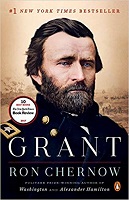 2. Grant by Ron Chernow
2. Grant by Ron Chernow
Published in 2017, this book by Ron Chernow dispels the many myths and misconceptions about Grant and depicts this iconic figure in a new light.
In the book’s introduction, Chernow argues that Grant was not the incompetent drunk that his critics pegged him as but was instead a very complex and misunderstood man:
“Dismissed as a philistine, a boor, a drunk, and an incompetent, Grant has been subjected to pernicious stereotypes that grossly impede our understanding of the man. As a contemporary newspaper sniffed, Grant was ‘an ignorant soldier, coarse in his taste and blunt in his perceptions, fond of money and material enjoyment and of low company.’ In fact, Grant was a sensitive, complex, and misunderstood man with a shrewd mind, a wry wit, a rich fund of anecdotes, wide knowledge, and penetrating insights”
Furthermore, Chernow argues that the accusation that Grant was a “butcher” of his troops is ironic considering that he hated the sight of blood, detested violence and refused to romanticize warfare.
Chernow also takes issue with the fact that many people consider Grant a rube in Washington when he was actually a skilled, adept politician whose most notable achievement, safeguarding the civil rights of African Americans, was overshadowed by the scandals of his administration:
“What has been absent from most Grant biographies is a systemic account of his relations with the four million slaves, whom he helped to liberate, feed, house, employ, and arm during the war, then shielded from harm when they became citizens. Frederick Douglass paired Grant with Lincoln as the two people who had done most to secure African American advances”
The book received positive reviews when it was published, became a number one New York Times bestseller and a number one Amazon seller and was named one of the best books of the year by Goodreads, Amazon, The New York Times, Newsday, BookPage, Barnes and Noble and the Wall Street Journal.
Yale professor David W. Blight reviewed the book for the New York Review of Books and praised it as an “expansive new life of Grant. It is a work of striking anecdotes, skillful pacing, and poignant judgments.”
Janet Maslin reviewed the book for the New York Times and described it as “vast and panoramic in ways that history buffs will love. Books of its caliber by writers of Chernow’s stature are rare, and this one qualifies as a major event…. Chernow is clearly out to find undiscovered nobility in his story, and he succeeds; he also finds uncannily prescient tragedy. There are ways in which Grant’s times eerily resemble our own…Indispensable.”
In addition, Publishers Weekly referred to it as “The definitive biography for the foreseeable future.”
Yet, T.J. Stiles’ review in the Washington Post was a little more subdued, and although Stiles praised the book’s research, he takes issue with Chernow’s prose:
“His design does not delight with artful structure and delivers no pleasures of expectation, revelation or surprise. He rarely opens a chapter with sentences that hum the themes to come. He does not switch the point of view to allow a secondary character to expand the book’s scope. He stacks up adjectives, cliches and stock phrases.”
Ron Chernow is an author who has written numerous historical biographies, including Alexander Hamilton; Washington: A Life; Titan: The Life of John D. Rockefeller, as well as other history books.
In 2015, Chernow won the National Humanities Medal and, in 2011, won the Pulitzer Prize for his book Washington: A Life. Chernow also won the National Book Award for his first book The House of Morgan in 1990 and Chernow’s book, Alexander Hamilton, was the inspiration for the hit Broadway play Hamilton.
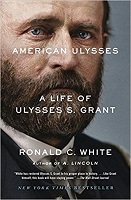 3. American Ulysses: A Life of Ulysses S. Grant by Ronald C. White
3. American Ulysses: A Life of Ulysses S. Grant by Ronald C. White
Published in 2016, this book by Ronald C. White also tries to dispel the many misconceptions about Grant to show him as the popular war hero he was during the 19th century.
White argues, in the book’s preface, that Grant’s reputation has been dismantled over the years by Lost Cause supporters who have tried to paint him in a negative light in order to boost the reputation of Robert E. Lee and the Confederacy:
“Although he was renowned at the time of his death in 1885, it was not long before Grant began to fall from favor. Historians writing under the influence of the Southern ‘Lost Cause’ lifted up Robert E. Lee and the Confederacy in the ‘War of Northern Aggression.’ In their retelling, Grant became the ‘butcher’ who supposedly countenanced the merciless slaughter of his soldiers to overwhelm by sheer numbers the courageous Southern army.”
White goes on to say that when Grant is remembered he is often described as a simple, unintellectual man who lacked leadership skills, such as in William S. McFeely’s biography of Grant where he declares “I am convinced Ulysses S. Grant had no organic, artistic, or intellectual specialness… so he became a general and president because he could find nothing better to do.”
White argues that Grant is grossly underestimated and that he was an “exceptional person and leader” who was celebrated during his lifetime as the one of three great leaders of the nation, next to Abraham Lincoln and George Washington.
The book received positive reviews when it was published. A review by T.J. Stiles in the New York Times stated that although the book is not perfect it explores Grant’s character better than any author before:
“I wish that ‘American Ulysses’ delved more deeply into Grant’s contradictions, yet agree with its final tally. White delineates Grant’s virtues better than any author before, and they outweighed his flaws. By the end, readers will see how fortunate the nation was that Grant went into the world — to save the Union, to lead it and, on his deathbed, to write one of the finest memoirs in all of American letters.”
A review by Rick Moser in the Chicago Tribune called it a “superb new biography” that is “highly engaging…illuminating, inspiring and deeply moving.”
The book became a New York Times best-seller and won the William Henry Seward Award for Excellence in Civil War Biography in 2016.
White is an author who has written numerous books about 19th century historical figures, such as A. Lincoln: A Biography; Lincoln’s Greatest Speeches; The Eloquent President: A Portrait of Lincoln Through His Words, as well as number of other books on American history.
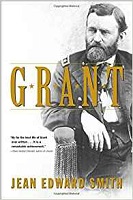 4. Grant by Jean Edward Smith
4. Grant by Jean Edward Smith
Published in 2001, this book by Jean Edward Smith explores Grant’s personal motivations and inner character.
Smith states, in the preface to the book, that most biographers see Grant as two different people, the great Civil War general and the failed politician, but Smith argues that there was actually a common thread in everything Grant did:
“It has been customary for biographers to divide Grant’s career at Appomattox almost as if he were two different men: the successful military commander and the failed politician. This biography emphasizes the continuity in Grant’s life. The common thread is strength of character – an indomitable will that never flagged in the face of adversity.”
Smith goes on to say that although many biographers see Grant as a failed politician, Smith argues that Grant is actually a greatly underrated president and the same strength and courage that helped him on the battlefield also served him well in the White House, leading him to become the only president between Andrew Jackson and Woodrow Wilson to serve two terms and helping him guide the nation through the post-Civil War era of Reconstruction.
The book received positive reviews when it was published and was nominated for the Pulitzer Prize in Biography in 2002.
A review on the website My Journey Through the Best Presidential Biographies praised the book as one of the best books about Grant:
“Smith’s biography is the most widely read of all the Ulysses S. Grant biographies and with good reason. Among the eighty-four presidential biographies I’ve read so far, Smith’s narrative has perhaps the best combinations of effortless fluidity, vivid detail, historical context and insight that I’ve encountered…Simply stated, Jean Edward Smith’s ‘Grant’ is very nearly my ideal biography; it is colorful and descriptive, consistently articulate and incredibly informative. I almost cannot imagine a better biography of Ulysses S. Grant.”
Richard Brookhiser reviewed the book for the New York Times and summed it up as a long overdue payment of gratitude to this “historically mistreated president”:
“When Grant was old and broke, he got a check from a stranger for $500, with a note: ‘General, I owe you this for Appomattox.’ Jean Edward Smith’s ‘Grant’ is another installment of the debt we all still owe him.”
Jean Edward Smith is the John Marshall Professor of Political Science at Marshall University. Smith has written a number of presidential biographies, including Eisenhower in War and Peace; FDR; Bush; and George Bush’s War.
In 2008, Smith won the Francis Parkman Prize for his book FDR.
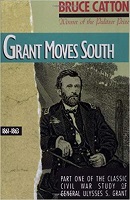 5. Grant Moves South by Bruce Catton
5. Grant Moves South by Bruce Catton
Published in 1960, this book by Bruce Catton is part one of a two-part biography of Ulysses S. Grant.
This book chronicles Grant’s development as a military leader and follows him from his initial enlistment in June of 1861 to the fall of Vicksburg in July of 1863.
The book explores Grant’s successes at Fort Donelson, Shiloh, and Vicksburg and discusses why he succeeded. Catton argues that his success was due to his willingness to learn from his mistakes, his growing strategic and tactical understanding, the support of his officers like Sherman and McPherson and his refusal to accept defeat.
The book became a New York Times best-seller and received positive reviews when it was published, A review in the Pennsylvania Magazine of History and Biography praised the book for its prose and extensive research:
“It is based on extensive and careful research. The story is told with color and drama. Grant comes alive as a man and a soldier. His evolution as a soldier and leader is traced in an interesting and effective manner.”
The book is a follow up to Lloyd Lewis’s book Captain Sam Grant, which was intended to be a trilogy about Grant but Lewis died shortly after writing the first book so Catton was asked by the publisher to finish the remaining two books.
Bruce Catton, who died in 1978, was a former newspaper reporter, government employee and author who wrote a number of highly-acclaimed books on the Civil War, including his Civil War trilogy Mr. Lincoln’s Army; Glory Road; Stillness at Appomattox, among others.
Catton won the Pulitzer Prize and the National Book Award in 1954 for his book Stillness at Appomattox. In 1959, he won the Meritorious Service Award in the Field of Civil War History. In 1960, he was named chairman of the New York state Civil War Commission. In 1977, he won the Presidential Medal of Freedom from Gerald R. Ford.
Catton also served as the editor of American Heritage Magazine from 1954-1959 and served as senior editor from 1959 until his death in 1978.
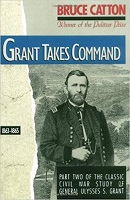 6. Grant Takes Command: 1863-1865 by Bruce Catton
6. Grant Takes Command: 1863-1865 by Bruce Catton
Published in 1969, this book by Bruce Catton is part two of a two-part biography of Ulysses S. Grant. This book follows Grant through the last half of the war and examines how he helped win the war.
The book explores not only how Grant fought the Confederates but how he worked with his fellow officers and politicians to win the war.
The book became a New York Times best-seller and is the more popular of Catton’s two books on Grant, regularly outselling the first book.
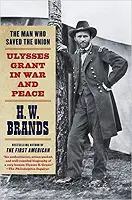 7. The Man Who Saved the Union: Ulysses S. Grant in War and Peace by H.W. Brands
7. The Man Who Saved the Union: Ulysses S. Grant in War and Peace by H.W. Brands
Published in 2012, this book by H.W. Brands covers the life of Ulysses S. Grant from his childhood to his death in 1885.
The book discusses Grant’s childhood and family history, how Grant’s war time experience prepared him for the presidency and also discusses his many accomplishments as president, which Brands argues have been greatly underestimated.
The book received positive reviews when it was published. A review in Publishers Weekly praised the book, calling it comprehensive and very readable:
“This new biography by University of Texas–Austin history professor Brands (Traitor to His Class) is comprehensive but well-paced and vividly readable; his narrative of Grant’s military campaigns in particular is lucid, colorful, and focused on telling moments of decision. His Grant emerges as an immensely appealing figure—though except for a wartime outburst of anti-Semitism, later repented, which the author relates—with a keen mind, stout character, and unpretentious manner. The result is a fine portrait of the quintessential American hero.”
Other reviews also praised Brands’ storytelling skills but argued that the book is a little too general sometimes.
David M. Shribmen’s review in the Boston Globe states that although it is a very comprehensive book, some of Brands arguments lack supporting details:
“This is a biography that is both comprehensive and comprehensible but not always compelling. It is a thorough examination of Grant’s life — but it skims over the life Grant lived. We know of his devotion to his wife, Julia, for example, but her character is not developed nor is the abiding romance between the two. We know Grant was sentimental, but we don’t see much of that either.”
Eric Foner’s review in the Washington Post states that Brands is a great storyteller but the book lacks analysis that would help us understand Grant better:
“Brands is essentially a storyteller, and a good one. His prose is lucid and colorful. He evokes the atmosphere of Grant’s era by filling the book with lengthy excerpts from primary sources — letters, first-person observations and recollections. What Brands does not do, however, is present new interpretive insights on questions that have engaged generations of historians: the “modernity” of the Civil War, the centrality of emancipation to the war’s outcome, the reasons for the failure of Reconstruction.”
Foner goes on to say that Brands’ sporadic mentions of Grant’s commitment to civil rights issues and his role in the battle over reconstruction does not dive deep enough and needs further elaboration.
Yet, a review by Randy Dotinga in the Christian Science Monitor praises the book and Brands for his straightforward storytelling style:
“The Man Who Saved the Union: Ulysses Grant in War and Peace – is a treat for history buffs and anyone else who enjoys a life story well-told…But this isn’t a modern-style biography that psychoanalyzes its subject and tries to imagine what he or she was thinking. Well-respected historian H.W. Brand is straightforward and avoids speculation…Richly detailed and deeply moving, ‘The Man Who Saved the Union’ has a you-are-there quality thanks to its carefully drawn sketches of people and places.”
A review in the Pittsburgh Post Gazette calls the book “an extraordinarily well-written survey of Grant’s life that aims to rehabilitate his image” and a review by Kirkus Review states that Brands’ “ portrayal of his subject’s essential humanity proves truly compelling…A direct, engaging approach to Grant’s life that would have pleased him.”
H.W. Brands is the Dickson Allen Anderson Centennial Professor of History at the University of Texas at Austin.
Brands has written numerous books about historical figures, including The General Vs. the President: MacArthur and Truman at the Brink of the Nuclear War; The First American: The Life and Times of Benjamin Franklin; Andrew Jackson: His Life and Times; Traitor to His Class: The Privileged Life and Radical Presidency of Franklin Delano Roosevelt; Reagan: The Life.
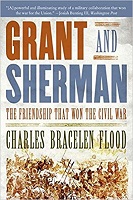 8. Grant and Sherman: The Friendship that Won the Civil War by Charles Bracelen Flood
8. Grant and Sherman: The Friendship that Won the Civil War by Charles Bracelen Flood
Published in 2005, this book by Charles Bracelen Flood is about the friendship between Ulysses S. Grant and William Tecumseh Sherman and how their bond affected their lives.
In the book’s prologue, Flood argues that prior to the war, the two men were both “failures” but they finally found their stride once they were united:
“Enormous military and political results flowed from the friendship between Ulysses S. Grant and William Tecumseh Sherman, two men who had been obscure failures before the Civil War…Throughout the war, each supported the other’s efforts in every way; each furthered and on occasion saved the other’s career”
Flood goes on to say that the two men were indeed like “brothers,” just as Sherman had once famously said, and this bond is what spurred them on during the tough times:
“Sherman was right when he said of himself and Grant, ‘We were as brothers.’ They did the things that devoted brothers do: back each other up, help each other out, sacrifice for the other. It was Sherman, standing to gain if Grant resigned from the army, who talked him out of going home when Halleck sidelined him after Shiloh; it was Sherman who told Grant to go ahead and send him into action at Hayne’s Bluff above Vicksburg, a move likely to hurt Sherman’s reputation but one that might help the Vicksburg campaign as a whole; it was Grant’s steadfast support that led Sherman to say after Vicksburg, ‘I knew wherever I was that you thought of me, and that if I got in a tight place you would come if alive’”
The book received positive reviews when it was published. A review in Publisher’s Weekly states that though there are better biographies on both men, this book is unique because it focuses solely on their relationship:
“The key, Flood writes, is that Sherman was the ideal subordinate, brilliant but insecure. In Grant he found a leader whose poise was contagious and who convinced Sherman he could do whatever job he was assigned. Better biographies of both exist, but Flood (Lee: The Last Years ) has written a solid book that illuminates their productive relationship.”
A review by Kirkus Reviews praised the book as well written and deemed it a great addition to Civil War literature:
“A well-crafted study of ‘two failed men with great potential’ without whom the Civil War might have ended differently….Flood’s overarching theme of Grant and Sherman’s friendship, born in fire, is sometimes swept under by a surfeit of Big Picture historical detail, but in those instances, the book becomes a careful survey of the Civil War in the West. Of interest to students of early modern warfare, in particular, is Flood’s account of how Sherman, always in close contact with Grant, conducted his scorched-earth campaigns in Georgia and South Carolina—and how both generals detested the press, a theme that resounds in our own time. A worthy contribution to the Civil War literature.”
In addition, Salon listed the book at number 9 on its list of the top 12 Civil War books ever written.
Charles Bracelen Flood, who died in 2014, was an author who wrote numerous books about the Civil War, including Lee: The Last Years; Grant’s Final History: Ulysses S. Grant’s Heroic Last Year; 1864: Lincoln at the Gates of History; Hitler: The Path to Power.
Flood also served as the President of PEN America Center and served on the governing bodies of the Authors League and the Authors Guild.
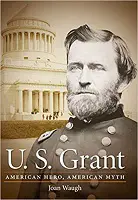 9. U.S. Grant: American Hero, American Myth by Joan Waugh
9. U.S. Grant: American Hero, American Myth by Joan Waugh
Published in 2009, this book by Joan Waugh explores the legacy of Ulysses S. Grant and why the once popular Grant eventually faded from memory in the 20th century.
In the book’s prologue, Waugh explains that Grant’s reputation faded because the meaning of the war itself became distorted and then forgotten over time:
“My project began with a question about Grant’s life, and his death. Why did Grant’s star shine so brightly for Americans of his own day, and why has it been eclipsed so completely for Americans since at least the mid-twentieth century? Most Americans indisputably are ignorant of the extent of the once-powerful national legacy of Ulysses S. Grant. To recover that legacy, I advance two arguments. First, Ulysses S. Grant was a gigantic figure in the nineteenth century, and second, the memory of what he stood for – Union victory – was twisted, diminished, and then largely forgotten…Even as the general was praised in lofty speeches at the end-of-the-century dedication, however, his reputation was subjected to a constant drumbeat of criticism from a small but influential group of ex-Confederate partisans; at the same time, eager reconciliationists from the North began to distort his legacy in pursuit of national unity.”
The book received positive reviews when it was published. Jonathan Yardley’s review in the Washington Post praised the book for its intriguing thesis and clear prose:
“Thus we have the question that stands at the heart of Waugh’s exceptionally thoughtful and valuable book: ‘Why did Grant’s star shine so brightly for Americans of his own day, and why has it been eclipsed so completely for Americans since at least the mid-twentieth century?’ Though there can be no final, definitive answer to either part of the question, Waugh, professor of history at UCLA, provides intelligent, plausible suggestions. Not merely that, but at a time when too many professional historians employ unintelligible academic jargon, she writes clear prose that is readily accessible to the serious general reader.”
A review by Publisher’s Weekly called it engaging it “An engaging study of the making of Ulysses S. Grant’s reputation. . . . Waugh convincingly interprets Grant as ‘symboliz[ing] both the hopes and the lost dreams’ of the Civil War.”
A review by Julia Keller in the Chicago Tribune referred to the book as “brilliant”:
“Yet as Joan Waugh recounts in her brilliant and unsettling new study of the life and career of the nation’s 18th president, history has not been kind to Grant . . . . Part biography, part military history, part social chronicle charting the rise and fall of Grant’s reputation, U.S. Grant is a sobering reminder of the vicissitudes of fame. . . . But now the old soldier has some reinforcements: Waugh’s well-researched and vibrantly written book, restores luster to a lost American hero.”
Joan Waugh is a history professor at UCLA. Waugh has written numerous books about the Civil War including The American War: A History of the Civil War; Hearts Touched by Fire: The Best of Battles and Leaders of the Civil War; The Memory of the Civil War in American Culture.
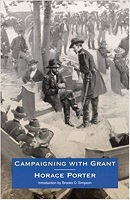 10. Campaigning with Grant by Horace Porter
10. Campaigning with Grant by Horace Porter
Published in 1897, this book by Horace Porter is a first-hand account of Porter’s time on Grant’s staff during the American Civil War.
The book explores how Ulysses S. Grant conducted himself in the field, particularly his personal traits, habits and motivations.
In the book’s preface, Porter explains that the purpose of the book is to understand Grant as a general and to show what it was like to serve with him:
“The chief effort of the author has been to enable readers to view the Union commanders near by, and to bring them into such intimate contact with him that they may know him as familiarly as those who served by his side”
Porter was a lieutenant colonel in the Union army who served as personal secretary to Grant during the last years of the war and also during Grant’s presidency.
Sources:
“Gen. Porter on Grant; His Reminiscences of Campaigns in the Civil War.” New York Times, 5 March. 1898, timesmachine.nytimes.com/timesmachine/1898/03/05/102107131.pdf
Keller, Julia. “Restoring Grant’s Legacy.” Chicago Tribune, 15 Nov. 2009, www.chicagotribune.com/news/ct-xpm-2009-11-15-0911120502-story.html
“Nonfiction Book Review: U.S. Grant: American Hero, American Myth.” Publisher’s Weekly, www.publishersweekly.com/978-0-8078-3317-9
Yardley, Jonathan. “Jonathan Yardley Reviews ‘U.S. Grant’ by Joan Waugh.” Washington Post, 22 Nov. 2009, www.washingtonpost.com/wp-dyn/content/article/2009/11/20/AR2009112001682.html
“Grant and Sherman by Charles Bracelen Flood.” Kirkus Review, 20 May. 2010, www.kirkusreviews.com/book-reviews/charles-bracelen-flood/grant-and-sherman/
“Grant and Sherman: The Friendship That Won the Civil War.” Publisher’s Weekly, www.publishersweekly.com/978-0-374-16600-7
Lafantasie, Glenn W. “Top 12 Civil War Books Every Written.” Salon, 27 Dec. 2010, www.salon.com/2010/12/27/civil_war_books_2011/
Purcell, Sarah J. “’The Man Who Saved the Union’: Making the Case for Ulysses S. Grant.” Pittsburg-Post-Gazette, 4 Nov. 2012, www.post-gazette.com/ae/book-reviews/2012/11/04/The-Man-Who-Saved-the-Union-making-the-case-for-Ulysses-S-Grant/stories/201211040272
“The Man Who Saved the Union by H.W. Brands.” Kirkus Review, www.kirkusreviews.com/book-reviews/hw-brands/man-who-saved-union/
Dotinga, Randy. “The Man Who Saved the Union.” Christian Science Monitor, 11 Oct. 2012, www.csmonitor.com/Books/Book-Reviews/2012/1011/The-Man-Who-Saved-the-Union
Schribman, David M. “’The Man Who Saved the Union’ by H.W. Brands.” Washington Post, 2 Nov. 2012, www.washingtonpost.com/opinions/the-man-who-saved-the-union-ulysses-grant-in-war-and-peace-by-h-w-brands/2012/11/02/154ae6e0-fe79-11e1-8adc-499661afe377_story.html?noredirect=on&utm_term=.9fa549396eea
“The Man Who Saved the Union: Ulysses S Grant in War and Peace.” Publisher’s Weekly, www.publishersweekly.com/978-0-385-53241-9
Foner, Eric. “The Man Who Saved the Union: Ulysses S. Grant in War and Peace.” Washington Post, 2 Nov. 2012, www.washingtonpost.com/opinions/the-man-who-saved-the-union-ulysses-grant-in-war-and-peace-by-h-w-brands/2012/11/02/154ae6e0-fe79-11e1-8adc-499661afe377_story.html?noredirect=on&utm_term=.9fa549396eea
Solonick, Justin, Jacob Olmsted and Ashley Lawmen. “Grant Takes Command.” Texas Christian University, personal.tcu.edu/swoodworth/Catton-GTC.htm
“Grant Takes Command by Bruce Catton” Kirkus Review, www.kirkusreviews.com/book-reviews/bruce-catton-8/grant-takes-command/
Hay, Thomas Robson. “The Pennsylvania Magazine of History and Biography.” The Pennsylvania Magazine of History and Biography, Vol. 85, no. 1, 1961, pp. 97–99. JSTOR, JSTOR, www.jstor.org/stable/20089374.
“Bruce Catton, Civil War Historian, Dies at 78.” New York Times, 29 Aug. 1978, archive.nytimes.com/www.nytimes.com/learning/general/onthisday/bday/1009.html
Blight, David W. “Bruce Catton.” American Heritage, vol. 62, issue 1, spring 2012, www.americanheritage.com/content/bruce-catton
Brookhiser, Richard. “Who’s Buried in Grant’s Tomb.” New York Times, 22 April. 2001, movies2.nytimes.com/books/01/04/22/reviews/010422.22brookht.html
“Review of Grant by Jean Edward Smith.” My Journey Through the Best Presidential Biographies, 13 Sept. 2014, bestpresidentialbios.com/2014/09/13/review-of-grant-by-jean-edward-smith/
“Nonfiction Book Review: Grant by Jean Edward Smith.” Publishers Weekly, www.publishersweekly.com/978-0-684-84926-3
Damsker, Matt. “Ulysses S. Grant Emerges as a hero in new bio.” USA Today, 15 Oct. 2016, www.usatoday.com/story/life/books/2016/10/15/american-ulysses-a-life-of-ulysses-s-grant-book-review/91730576/
Holzer, Harold. “The Most Misunderstood President.” Wall Street Journal, 21 Oct. 2016, www.wsj.com/articles/the-most-misunderstood-president-1477072198
Smith, Jordan Michael. “Ronald White’s magisterial new biography offers a fresh view of Ulysses S. Grant.” Boston Globe, 29 Sept. 2016, www.bostonglobe.com/arts/books/2016/09/28/ronald-white-magisterial-new-biography-offers-fresh-view-ulysses-grant/bt2hwHwGAX8T4uUWVuLnmK/story.html
Grenville-Mathers, Belle. “Review Article on Ulysses S. Grant.” Reviews in History, www.history.ac.uk/reviews/review/2270
Price, Matthew. “’American Ulysses’ review: Ronald C. White gives Ulysses S. Grant his due in new biography.” Newsday, 3 Oct. 2016, www.newsday.com/entertainment/books/american-ulysses-review-ronald-c-white-gives-ulysses-s-grant-his-due-in-new-biography-1.12399380
Moser, Rick. “’American Ulysses’ Tries to Set the Record Straight on the Civil War General.” Chicago Tribune, 21 Oct. 2016, www.chicagotribune.com/lifestyles/books/ct-books-1030-american-ulysses-grant-ronald-white-20161020-story.html
Stiles, T.J. “Ulysses S. Grant: A New Biography of ‘A Nobody From Nowhere.” New York Times, 19 Oct. 2016, www.nytimes.com/2016/10/23/books/review/american-ulysses-ronald-c-white.html
Blight, David W. “The Silent Type.” New York Review of Books, 24 May, 2018, www.nybooks.com/articles/2018/05/24/ulysses-grant-silent-type/
Gopnik, Adam. “Pour One Out for Ulysses S. Grant.” The New Yorker, 2 Oct. 2017, www.newyorker.com/magazine/2017/10/02/pour-one-out-for-ulysses-s-grant
Clinton, Bill. “President Clinton Looks Back at President Grant.” New York Times, 12 Oct. 2017,
Scanlan, Padriac. “Grant by Ron Chernow review – booze, slavery and an argument for greatness.” The Guardian, 6 Dec. 2017, www.theguardian.com/books/2017/dec/06/grant-ron-chernow-review
Plotz, David. “Grant by Ron Chernow, Reviewed by David Plotz.” Slate, 2 Oct. 2017, slate.com/culture/2017/10/grant-by-ron-chernow-reviewed-by-david-plotz.html
Duchschere, Kevin. “Review: ‘Grant,’ by Ron Chernow.” Star Tribune, 6 Oct. 2017, www.startribune.com/review-grant-by-ron-chernow/449664443/
Damsker, Matt. Book Review Grant Bio by Ron Chernow.” USA Today, 10 Oct. 2017, www.usatoday.com/story/life/books/2017/10/10/ron-chernows-latest-u-s-history-lesson-hamilton-heroic-grant/733270001/
Stiles, T.J. “Chernow’s portrait of Grant as a work of literary craftsmenship, if not art.” Washington Post, 6 Oct. 2017, www.washingtonpost.com/outlook/chernows-portrait-of-grant-as-a-work-of-literary-craftsmanship-if-not-art/2017/10/06/1139cbb2-9c89-11e7-9c8d-cf053ff30921_story.html?utm_term=.a2c915a3bcc8
Maslin, Janet. “In Ron Chernow’s ‘Grant,’ an American Giant’s Makeover Continues.” New York Times, 10 Oct. 2017, www.nytimes.com/2017/10/10/books/review-grant-biography-ron-chernow.html
Stiles, T.J. “The Ghost That Haunts Grant’s Memoirs.” New York Times, 13 Oct. 2017, www.nytimes.com/2017/10/13/books/review/john-marszalek-personal-memoirs-of-ulysses-s-grant.html
Reardon, Patrick. “Ulysses S. Grant’s Memoirs: An Appreciation.” Chicago Tribune, 19 Aug. 2016, www.chicagotribune.com/lifestyles/books/ct-prj-grants-memoirs-passion-pick-20160818-story.html
McCrum, Robert. “The 100 Best Nonfiction Books: No 55 – Personal Memoirs of Ulysses S. Grant.” The Guardian, 20 Feb. 2017, www.theguardian.com/books/2017/feb/20/100-best-nonfiction-books-personal-memoirs-ulysses-grant
Waugh, John. “On The Rise: Three Recent Books Redeem Ulysses S. Grant’s Reputation.” History Net, Aug. 2018, www.historynet.com/three-recent-books-redeem-ulysses-grant.htm
“30 Great Books About Ulysses S. Grant and Robert E. Lee.” About Great Books, www.aboutgreatbooks.com/topics/history/ulysses-s-grant-robert-e-lee/
“The Best Biographies of Ulysses S. Grant.” Best Presidential Biographies, 30 Sept. 2014, bestpresidentialbios.com/2014/09/30/the-best-biographies-of-ulysses-s-grant/
“The Best Books to Learn about President Ulysses S. Grant.” Book Scrolling, 13 Oct. 2016, www.bookscrolling.com/the-best-books-to-learn-about-president-ulysses-s-grant/
Reeves, John. “5 Essential Books on Ulysses S. Grant.” Medium, medium.com/@reevesjw/5-essential-books-on-ulysses-s-grant-eee1f1acaf61

